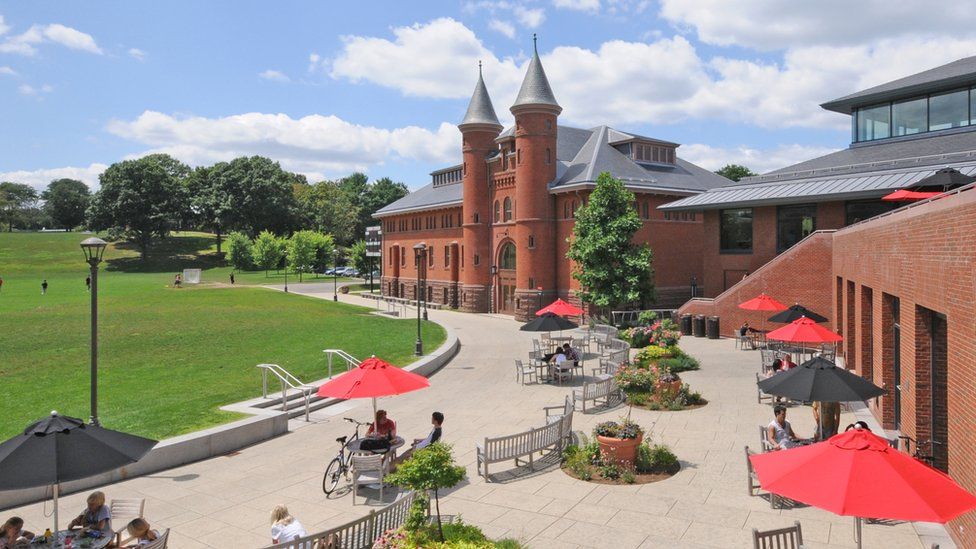
Wesleyan University: Top US college says it will end ‘legacy’ admissions

Wesleyan’s President said that legacy “indicates little” about a student’s abilities
By Bernd Debusmann Jr
BBC News, Washington
Wesleyan University, an elite US liberal arts college, says it will no longer grant preference to student applicants with family or donor ties.
The Connecticut institution said it was “important” to end so-called legacy admissions, long criticised as a perk for the white and wealthy.
It cited the Supreme Court’s recent ruling that race could no longer be considered as a factor in admissions.
A vast majority of Americans are against legacy admissions.
Supporters of legacy admissions processes argue that that practice helps create an active alumni community and encourages donations to universities.
In a statement on Wednesday, Wesleyan University President Michael Roth said “an applicant’s connection to a Wesleyan graduate indicates little about that applicant’s ability to succeed”.
For that reason, he said, such ties have played a “negligible” role in the university’s admission process.
Mr Roth also said that Wesleyan will continue to value its “ongoing relationships that come from multi-generational Wesleyan attendance”.
But there would be no legacy “bump” in its selection process from now on, he said.
Wesleyan joins a number of other US universities that have already rejected legacy admissions, including Johns Hopkins.
It is unclear how many students benefit from legacy admission policies each year, but studies suggest that the numbers are significant.
An Associated Press review of some of the top universities in the US found that the proportion of legacy cases among first-year students stood at between 4% and 23%.
At some prominent universities – including Notre Dame, the University of Southern California and Cornell – there were more legacy students than black students, the AP found.
Watch: Education secretary addresses end of affirmative action
Another study, from MIT, found that over a third of legacy applicants at an unnamed “elite” East Coast university were admitted, compared to 14% among non-legacy applicants.
Nearly 75% of legacy students offered admission were accepted, compared with 47% of non-legacy offers, which the study argued allows colleges to better plan finances and admission cycles.
An opinion poll conducted last year by the Pew Research Center found that 75% of Americans were against legacy admissions, up from 68% in 2019.
Adam Nguyen, a college admissions expert and CEO of Ivy Link – a firm that works with students aiming to enter elite US universities – told BBC News “the lid has been blown off” and that more schools are likely to follow Wesleyan’s suit.
But at many high-profile institutions, particularly in the Ivy League, efforts to reform legacy admissions practices will likely face “pushback”.
Instead, Mr Nguyen, a veteran of Columbia’s admission office, predicted that many universities will place a greater focus on “donor legacy” cases – in which families give money – rather than on legacy admissions cases based on family ties alone.
“A lot of money is riding on legacy admissions,” he said. “It takes a lot of money to run private universities, even with huge endowments. Tuitions are very high, but they don’t cover everything… and alumni donations are a big piece of a university’s finances”.
US President Joe Biden last month led criticism of the practice, saying that “adversity” should be considered in the college admissions process.
“When a poor kid, maybe the first in their family to go to college, gets the same grades and test scores as a wealthy kid whose whole family has gone to the most elite colleges in the country and whose path has been a lot easier, well, the kid who faced tougher challenges has demonstrated more grit, more determination,” he told reporters at the White House.
“That should be a factor that colleges take into account.”
Mr Biden’s comments came after the Supreme Court voted 6-3 to repeal decades-old US policies on so-called affirmative action, also known as positive discrimination.
Following the decision, a Boston-based non-profit, Lawyers for Civil Rights, filed a federal civil rights complaint against Harvard’s legacy admissions.
The legal action cited studies indicating that a vast majority – 70% – of legacy and donor-based applicants are white.
Congresswoman Barbara Lee, a California Democrat, referred to legacy admissions as affirmative action for white people.
Harvard has yet to publicly address the issue, but data revealed during the affirmative action cases found that the admissions rate for legacy applicants stood at 34% between 2014 and 2019.
Among applicants without legacy status, the rate was 6%.
Source: https://www.bbc.co.uk/news/world-us-canada-66249601?at_medium=RSS&at_campaign=KARANGA















